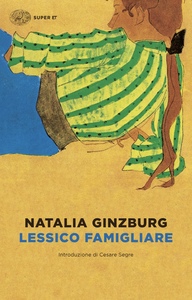You need to sign in or sign up before continuing.
Take a photo of a barcode or cover
emotional
funny
hopeful
reflective
sad
medium-paced
emotional
reflective
relaxing
medium-paced
emotional
reflective
medium-paced
emotional
funny
lighthearted
reflective
relaxing
medium-paced
emotional
reflective
relaxing
sad
medium-paced
dark
emotional
funny
lighthearted
medium-paced
Ho trovato questo breve romanzo davvero originale: l'autrice rappresenta ciascun membro della famiglia Levi attraverso i modi di dire e le parole peculiari che lo caratterizzano, le quali ritornano nel corso di tutta la narrazione.
Durante la lettura del romanzo, ambientato negli anni del fascismo, ho avuto l'impressione di trovarmi in casa Levi seguendo i personaggi nei loro pensieri e nella loro quotidianità: è un romanzo davvero immersivo e penso che la scrittura piana e scorrevole permetta di capire un po' meglio e da vicino un periodo storico complesso osservandolo quasi dall'interno, senza però conferirgli alcuna tragicità che potrebbe rendere il romanzo pesante e difficile da digerire. La storia non è il fulcro, è lo sfondo sul quale si svolgono le vicende e al tempo stesso il motore che, inevitalmente, guida e orienta la vita dei personaggi, i quali sono ispirati a persone reali (aspetto che ho apprezzato moltissimo, soprattutto per quanto riguarda i brevi scorci su quella che era la persona di Cesare Pavese).
Il mio interesse non è rimasto vivo sempre allo stesso modo: ho trovato alcune parti molto interessanti, altre un po' meno, ma nel complesso è un libro che sono contenta di aver letto e che mi ha lasciato tanto.
Durante la lettura del romanzo, ambientato negli anni del fascismo, ho avuto l'impressione di trovarmi in casa Levi seguendo i personaggi nei loro pensieri e nella loro quotidianità: è un romanzo davvero immersivo e penso che la scrittura piana e scorrevole permetta di capire un po' meglio e da vicino un periodo storico complesso osservandolo quasi dall'interno, senza però conferirgli alcuna tragicità che potrebbe rendere il romanzo pesante e difficile da digerire. La storia non è il fulcro, è lo sfondo sul quale si svolgono le vicende e al tempo stesso il motore che, inevitalmente, guida e orienta la vita dei personaggi, i quali sono ispirati a persone reali (aspetto che ho apprezzato moltissimo, soprattutto per quanto riguarda i brevi scorci su quella che era la persona di Cesare Pavese).
Il mio interesse non è rimasto vivo sempre allo stesso modo: ho trovato alcune parti molto interessanti, altre un po' meno, ma nel complesso è un libro che sono contenta di aver letto e che mi ha lasciato tanto.
dark
emotional
funny
hopeful
informative
reflective
sad
tense
medium-paced
There are books that sit with you quietly, like a relative who never raises their voice but somehow commands the whole room. Natalia Ginzburg’s Family Lexicon is one of them. It doesn’t demand your attention but earns it, page by page, voice by voice, until the house is full, and you’re sitting in the middle of it all, listening.
This is a memoir, sure. A family chronicle. But it reads like a long, continuous breath: a recounting of names, sayings, arguments, dinners, political conversations, and idle grumblings, each rendered in simple, bone-true prose. It’s a tapestry made of everyday threads, and what a marvel that it never unravels.
What Ginzburg captures here isn’t just the chaos of familial intimacy but the private language that binds people to one another - the recycled idioms, the half-jokes that outlive their punchlines, the things that are always said and never explained. It’s about Italy, yes, and fascism, and anti-fascism, and exile and fear, but it’s also about how a father clears his throat before he speaks, or what a sister refuses to say. The personal and political live side by side here, as they always do in real life.
There’s something slyly radical in how the book unfolds. Without dramatic arcs or moral declarations, Family Lexicon resists the conventions of both fiction and memoir. Ginzburg doesn’t shape the past to teach us anything neat. She presents it as it was: contradictory, fragmented, human. The social commentary is all the more powerful for how unadorned it is. It's anti-fascist resistance that doesn't arrive with speeches and banners, but rather shows up in who’s missing from the dinner table, in whispered anxieties, in the everyday courage of carrying on.
Reading Family Lexicon reminded me at times of The Anthropologists: that same subtle ache, that same glimpse into a world made up of tiny, unremarkable moments that somehow feel monumental. There’s a peculiar joy in that kind of storytelling. You don’t realize how deeply you’ve sunk into it until the book ends and you feel like someone’s just turned out the kitchen light.
A five-star read, no question. Quietly luminous. This is the kind of book that teaches you how to listen. And maybe how to remember.
This is a memoir, sure. A family chronicle. But it reads like a long, continuous breath: a recounting of names, sayings, arguments, dinners, political conversations, and idle grumblings, each rendered in simple, bone-true prose. It’s a tapestry made of everyday threads, and what a marvel that it never unravels.
What Ginzburg captures here isn’t just the chaos of familial intimacy but the private language that binds people to one another - the recycled idioms, the half-jokes that outlive their punchlines, the things that are always said and never explained. It’s about Italy, yes, and fascism, and anti-fascism, and exile and fear, but it’s also about how a father clears his throat before he speaks, or what a sister refuses to say. The personal and political live side by side here, as they always do in real life.
There’s something slyly radical in how the book unfolds. Without dramatic arcs or moral declarations, Family Lexicon resists the conventions of both fiction and memoir. Ginzburg doesn’t shape the past to teach us anything neat. She presents it as it was: contradictory, fragmented, human. The social commentary is all the more powerful for how unadorned it is. It's anti-fascist resistance that doesn't arrive with speeches and banners, but rather shows up in who’s missing from the dinner table, in whispered anxieties, in the everyday courage of carrying on.
Reading Family Lexicon reminded me at times of The Anthropologists: that same subtle ache, that same glimpse into a world made up of tiny, unremarkable moments that somehow feel monumental. There’s a peculiar joy in that kind of storytelling. You don’t realize how deeply you’ve sunk into it until the book ends and you feel like someone’s just turned out the kitchen light.
A five-star read, no question. Quietly luminous. This is the kind of book that teaches you how to listen. And maybe how to remember.
medium-paced
Reading this book, I thought of all the things my family and I, and my friends and I, say—the special language you guard with the people you love—and I felt joy.
Not only have I been blessed with incredible people in my life, but I also get to create and shape a unique language with them—whether it’s my parents, my brother, my cousin, my best friend, my close friends, the guy I’m seeing, or the lady who prepares my cappuccino each morning. This language, born from our shared thoughts and experiences, is ours alone, something no one outside could truly understand. It feels almost as if our language forms a shield, protecting us.
Language is everything. Freedom is everything.
My people are everything.
Not only have I been blessed with incredible people in my life, but I also get to create and shape a unique language with them—whether it’s my parents, my brother, my cousin, my best friend, my close friends, the guy I’m seeing, or the lady who prepares my cappuccino each morning. This language, born from our shared thoughts and experiences, is ours alone, something no one outside could truly understand. It feels almost as if our language forms a shield, protecting us.
Language is everything. Freedom is everything.
My people are everything.



